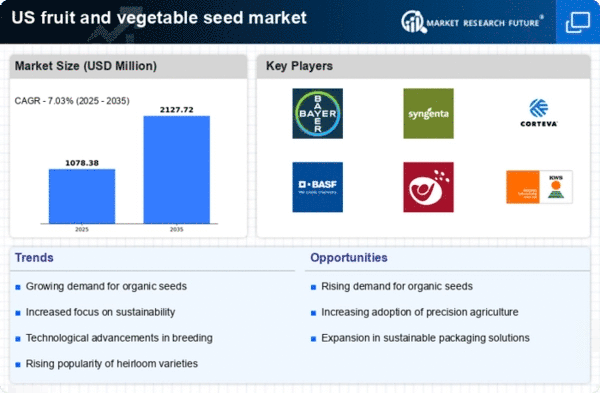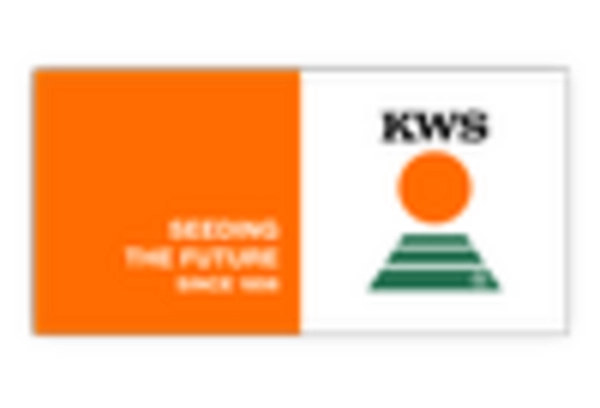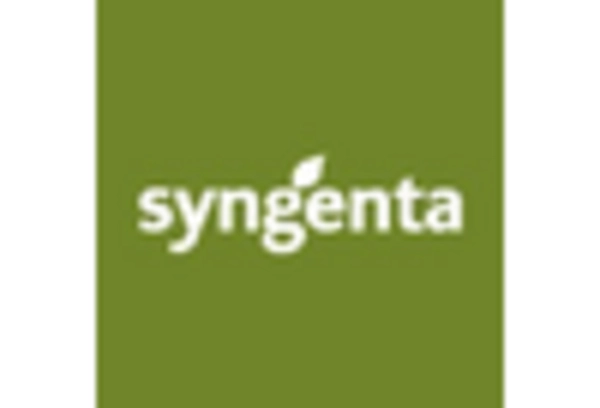Rising Interest in Home Gardening
The fruit vegetable-seed market is benefiting from a rising interest in home gardening, as more individuals seek to cultivate their own fruits and vegetables. This trend is fueled by a desire for self-sufficiency and the enjoyment of gardening as a hobby. Retail sales of seeds for home gardening have surged, with an estimated increase of 25% in the past year. This growing consumer base is likely to drive demand for a diverse range of seeds, including heirloom and specialty varieties. As home gardening continues to gain popularity, the fruit vegetable-seed market is expected to expand, catering to the needs of novice and experienced gardeners alike.
Technological Innovations in Seed Breeding
Technological innovations in seed breeding are transforming the fruit vegetable-seed market. Advances in genetic engineering and biotechnology are enabling the development of seeds that are more resilient to pests, diseases, and climate variations. This is particularly relevant as farmers face increasing challenges due to changing weather patterns. The introduction of genetically modified seeds has led to higher yields and reduced reliance on chemical pesticides, which is appealing to both farmers and consumers. The market is projected to grow as these technologies become more accessible, potentially increasing the adoption rate of innovative seeds in the fruit vegetable-seed market.
Increasing Demand for Locally Sourced Produce
The fruit vegetable-seed market is experiencing a notable surge in demand for locally sourced produce. Consumers are increasingly prioritizing fresh, locally grown fruits and vegetables, which has led to a corresponding rise in the need for seeds that can thrive in regional climates. This trend is reflected in the market, where sales of seeds for local varieties have increased by approximately 15% over the past year. As consumers become more health-conscious and environmentally aware, the preference for local produce is likely to continue driving growth in the fruit vegetable-seed market. This shift not only supports local economies but also encourages sustainable agricultural practices, further enhancing the appeal of locally sourced seeds.
Expansion of Sustainable Agriculture Practices
Sustainable agriculture practices are gaining traction within the fruit vegetable-seed market, driven by a growing awareness of environmental issues. Farmers are increasingly adopting methods that minimize chemical usage and promote biodiversity, which in turn influences seed selection. The market for organic seeds has seen a significant increase, with organic seed sales rising by 20% in the last year alone. This shift towards sustainability is not merely a trend but appears to be a fundamental change in agricultural practices. As more farmers embrace sustainable methods, the demand for seeds that align with these practices is expected to grow, thereby shaping the future landscape of the fruit vegetable-seed market.
Government Support for Agricultural Innovation
Government support for agricultural innovation plays a crucial role in shaping the fruit vegetable-seed market. Various initiatives and funding programs are designed to promote research and development in seed technology and sustainable farming practices. This support is essential for fostering innovation and ensuring that farmers have access to the latest seed varieties. Recent government reports indicate an increase in funding for agricultural research by approximately 10% over the last year. Such investments are likely to enhance the competitiveness of the fruit vegetable-seed market, as they facilitate the introduction of new and improved seed varieties that meet the evolving needs of farmers and consumers.

















